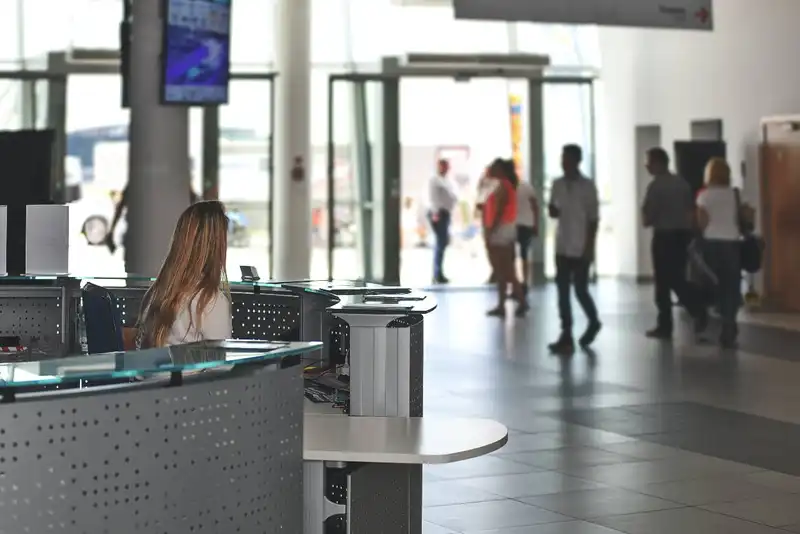What is a customer service survey?
A customer service survey is a tool used by businesses to gather feedback from customers about their experiences with products, services, or interactions. These surveys help companies understand customer satisfaction levels, identify areas for improvement, and make informed decisions to enhance overall customer experience.
The Importance of Customer Service Surveys in the Hospitality Industry
Modern Hospitality
The hospitality industry, known for its dynamic nature, has witnessed profound transformations over the years. From the modest inns of the past to the opulent five-star resorts of today, the sector has continually adapted to meet the changing desires and expectations of its patrons. At the heart of these changes lies one consistent drive- to offer unparalleled guest experiences. As travelers became more global, connected, and discerning, the industry responded with innovations in service, technology integration, and curated experiences. These shifts reflect the industry's commitment to understanding and catering to its guests' evolving needs and preferences.
In this ever-changing landscape, staying attuned to guest feedback becomes paramount. Enter the role of customer service surveys. These are not just a set of questions asked post-stay or post-dining. They represent a critical bridge between businesses and their clientele, a way to listen actively to what guests are saying. In an industry where every detail can make or break a guest's experience, these surveys serve as a barometer for success. They help identify what's working, what's not, and where there might be room for enhancement or change.
The essence of hospitality revolves around the guest experience. Whether it's the warmth of a greeting, the comfort of a room, or the taste of a dish, every touchpoint contributes to a guest's overall impression. But how does one ascertain if these touchpoints are hitting the mark? How does a business know if its innovations and services are truly resonating with its audience? This is where the significance of customer service surveys shines through.
By gathering candid feedback, these tools offer insights that can drive operational improvements, shape service training, and ultimately ensure that guests leave with memorable experiences worth revisiting and recommending. As we navigate the intricacies of the hospitality world, understanding the power of the customer's voice, captured through these surveys, becomes our guiding light.
The Changing Landscape of Guest Expectations

The evolution of the hospitality industry is intrinsically tied to the changing expectations of its guests. As societal norms, technologies, and lifestyles have evolved, so too have the desires and demands of modern travelers. The metamorphosis is evident- yesterday's luxury is today's standard, and what was once a delightful surprise is now an anticipated service.
Decades ago, a traveler's primary expectation from a hotel might have been a clean room in a safe environment. Today, that same traveler anticipates not just cleanliness and safety but also high-speed Wi-Fi, a state-of-the-art gym, personalized services, and perhaps even an eco-friendly environment. This evolution stems from the intersection of technological advancements, increased global exposure, and a heightened awareness of global issues. For instance, with the rise of social media, a traveler exposed to unique experiences from around the world now seeks similar, if not better, experiences in their journeys.
Moreover, the modern traveler is not just looking for a place to stay; they're seeking an experience. They desire local immersion, wanting to taste the local cuisine, understand the culture, and even partake in native traditions. Boutique hotels and B&Bs offering authentic local experiences have, thus, seen a surge in popularity. Similarly, the rise of platforms like Airbnb reflects a shift towards personalized, homely stays over generic hotel rooms. Another notable shift is the increasing emphasis on sustainable and responsible tourism. Environmentally-conscious travelers are now scrutinizing their chosen accommodations for sustainability practices, from water conservation measures to waste management.
Digital transformation has also played its part. The modern guest expects seamless online booking experiences, virtual tours, online check-ins, and real-time support through chatbots or apps. They value reviews and rely heavily on online feedback when making their decisions, underscoring the importance of maintaining a positive online reputation.
All these shifts and more underline a central theme- the importance of keeping up with changing guest expectations. Hospitality businesses that remain static, clinging to old models and outdated services, risk becoming obsolete. On the other hand, those that listen, adapt, and innovate in line with evolving demands not only survive but thrive. Meeting these expectations is not merely about ensuring a guest returns; it's about ensuring the survival and relevance of the business in a fiercely competitive industry.
Why Customer Service Surveys Matter
In the hospitality industry, where every move is choreographed to ensure the guest's delight, understanding the rhythm and preferences of the audience is paramount. And in this realm, customer service surveys play an indispensable role. They are not mere feedback forms but the very pulse of an industry that thrives on personal connections and exceptional experiences.
At their core, these surveys offer a genuine window into the guest's mind. They capture candid emotions, sentiments, and insights that might otherwise remain unsaid. Let's explore some fundamental reasons why these surveys are of paramount importance-
Understanding Guest Preferences
Every guest is unique, bringing with them a distinct set of preferences, needs, and expectations. Whether it's a preference for a quiet room away from the elevator or an appreciation for vegan breakfast options, these small details can significantly impact a guest's overall experience. Surveys provide an organized and efficient way to capture these nuances, allowing businesses to cater to individualized needs and desires.
Identifying Areas of Improvement
No operation is flawless, and there's always room for growth. Through surveys, guests can voice concerns, point out deficiencies, or highlight areas where the service didn't meet their expectations. This feedback is invaluable, as it offers a clear roadmap for where improvements are needed, whether it's faster room service, better Wi-Fi connectivity, or more knowledgeable staff.
Validation of Changes
When businesses implement changes, be it in service protocols, amenities, or even interior decor, it's vital to gauge how these changes resonate with guests. Surveys act as a feedback loop, validating whether the changes were beneficial or if they need further refinement.
Building Trust and Transparency
By actively seeking feedback, businesses convey a simple yet powerful message to their guests- "Your opinion matters." This not only fosters trust but also creates an atmosphere of transparency. Guests feel valued and heard, leading to a deeper connection with the brand or establishment.
Data-Driven Decision Making
In an age where data is gold, the aggregated insights from surveys offer a treasure trove of actionable information. This data can be analyzed to discern patterns, predict trends, and make informed decisions, from marketing strategies to service enhancements.
In essence, customer service surveys are the compass of the hospitality industry. They guide businesses towards excellence, ensuring that every guest's experience is not just satisfactory but truly memorable. In a world where choices are abundant, and guests can easily switch allegiance, understanding their heartbeat through surveys can be the difference between fleeting visits and lasting loyalty.
Feedback as a Tool for Refinement
Feedback, often regarded as the bridge between service delivery and guest expectations, is an invaluable asset in the hospitality industry. It's the gentle nudge that guides a business towards excellence, ensuring that offerings align with guest desires and continuously evolve to meet their changing needs. When wielded right, feedback doesn't just drive improvement; it becomes the cornerstone for refinement and reinvention.
Consistency in Feedback Collection
The hospitality landscape is ever-changing. From fluctuating travel trends to shifts in guest preferences, what was once in vogue can quickly become passe. Thus, it's not enough to collect feedback sporadically or only after a significant change. Consistent feedback, sought at regular intervals, ensures that a business remains in tune with its guests' pulse. It paints a clearer picture of the ongoing strengths and weaknesses, allowing businesses to be proactive rather than reactive.
The Power of Iterative Refinement
Continuous feedback provides an opportunity for iterative refinement. Instead of waiting for issues to escalate or become glaringly obvious, businesses can make small, regular adjustments. This iterative approach ensures that services and offerings are always in alignment with guest expectations. For instance, if feedback consistently points towards a need for more diverse menu options, hotels can gradually introduce new dishes, gauge their popularity, and refine based on further feedback.
Small Tweaks, Significant Impact
At times, it's the most subtle changes, driven by feedback, that can drastically elevate the guest experience. A minor adjustment in room lighting, a broader range of amenities, or even a change in the background music can make a world of difference. These small tweaks, often overlooked in the grander scheme of things, can be brought to light through attentive feedback collection. For example, if guests frequently mention that they miss having a particular amenity, like a specific brand of toiletries, introducing it can instantly enhance their comfort and overall experience.
Closing the Feedback Loop
Collecting feedback is only half the battle won. It's crucial to also communicate back to the guests, especially if their feedback led to a change. This not only establishes trust but also reinforces the idea that their opinions are valued and acted upon.
Overall, feedback in the hospitality industry isn't merely a tool for improvement; it's the catalyst for continuous refinement. In a sector where experiences define success, the consistent collection and implementation of feedback ensures that businesses are always in step with their guests' desires. It underscores the principle that in hospitality, it's the smallest details, often highlighted through feedback, that craft the most memorable experiences.
Ensuring the Voice of the Guest is Heard

In an industry built on the pillars of service and experience, the voice of the guest reigns supreme. Every guest enters an establishment with a unique set of expectations, desires, and perspectives. Ensuring that this voicethis mosaic of individual experiences and sentimentsis heard and acknowledged is fundamental to fostering loyalty, trust, and satisfaction.
Valued Guests are Returning Guests
At the heart of every memorable hospitality experience lies a feeling of being valued. When guests perceive that their feedback, preferences, and concerns are being genuinely considered, they naturally gravitate towards such establishments. It's not just about providing a luxurious room or an exquisite meal; it's about creating an environment where guests feel seen and heard. This emotional connection, often built on the simple premise of attentive listening, can transform one-time visitors into lifelong patrons.
Surveys as a Two-Way Conversation
Traditionally, the hospitality experience might have seemed like a one-way street, with establishments providing services and guests consuming them. However, modern hospitality recognizes the importance of a two-way dialogue. Surveys act as this channel of open communication. They aren't just tools for collecting feedback but platforms where guests can share their stories, insights, and even suggestions. Whether it's a recommendation for a new menu item, feedback on room decor, or an insight into local attractions, surveys empower guests to co-create their experience.
Guests as Partners in the Improvement Journey
Every piece of feedback, whether positive or constructive, is a step towards betterment. When establishments act on this feedback, they indirectly involve guests in the service improvement process. For instance, if several guests point out that the spa services could benefit from certain enhancements, and the establishment subsequently integrates those suggestions, it sends a powerful message. It tells guests that their opinions matter and can drive change. This not only boosts guest satisfaction but also fosters a sense of community and partnership.
Building a Culture of Active Listening
Beyond the technicalities of surveys lies the broader principle of active listening. It's about cultivating a culture where every team member, from the front desk staff to the management, values guest insights. Such a culture not only improves service delivery but also deepens the bond between guests and establishments.
The voice of the guest is the compass that can guide hospitality businesses towards unparalleled excellence. By ensuring this voice is consistently heard and acted upon, establishments can craft experiences that resonate deeply, making guests feel not just served, but truly valued and understood.
Quantifying Guest Satisfaction
The realm of hospitality thrives on crafting memorable, unparalleled experiences for guests. While the joy of a guest's smile or their words of appreciation provide qualitative assurance of their contentment, there is an undeniable need to quantify this satisfaction. By transforming intangible sentiments into measurable data, establishments can gauge their performance more objectively and make informed decisions.
Surveys - Translating Feelings into Figures- Surveys serve as a crucial tool in this quest to quantify guest satisfaction. By presenting structured questions that elicit responses on a scalebe it numeric, stars, or emoticonssurveys offer a clear metric. For instance, a question like, "On a scale of 1 to 10, how satisfied were you with our room service?" gives a tangible number to a guest's satisfaction level. Such quantified data, when aggregated, offers a holistic view of customer satisfaction and helps pinpoint areas of excellence or those needing attention.
Data-driven Insights and Patterns - Once guest satisfaction is quantified, it can be analyzed in various ways. Patterns may emerge. Perhaps satisfaction scores dip during peak seasons, indicating potential understaffing or overburdened services. Or maybe a newly introduced amenity consistently scores high, signifying its positive reception. These data-driven insights provide a foundation for strategic planning, ensuring that decisions are rooted in real guest feedback rather than mere intuition.
The Value of Measurable Data - The power of quantified guest satisfaction extends far beyond immediate insights. It plays a vital role in several business facets.
- Benchmarking - By regularly quantifying customer satisfaction, establishments can set benchmarks for themselves. It allows them to track performance over time and set tangible targets for the future.
- Marketing and Reputation - Quantified satisfaction scores can be used in marketing campaigns, showcasing the establishment's commitment to excellence. High satisfaction ratings can enhance an establishment's reputation, making it more attractive to potential guests.
- Investment and Budgeting - Data on guest satisfaction can guide investment decisions. If a particular service consistently scores low, it might be time to reinvest in its improvement or reconsider its offering. Conversely, high-scoring areas might warrant further expansion or promotion.
Challenges and Solutions in Survey Implementation
Surveys are powerful tools that bridge the gap between hospitality businesses and their guests, offering insights that can enhance the overall customer experience. However, deploying effective surveys isn't always a straightforward task. Several challenges might arise, potentially hindering the collection of genuine, actionable feedback. Recognizing these challenges and implementing strategic solutions is pivotal to the survey process's success.
Challenge 1 - Low Response Rates
Often, guests might overlook or choose not to participate in surveys, leading to a diminished pool of feedback.
Solution - One effective way to boost response rates is by ensuring that the survey is easily accessible and doesn't take too long to complete. Incentivizing participation, whether through discounts, loyalty points, or exclusive offers, can also encourage guests to share their thoughts.
Challenge 2 - Ambiguous Questions
If survey questions are vague or open-ended, they may lead to inconsistent responses or confuse the respondent.
Solution - Craft questions that are clear, concise, and specific. Using a mix of scaled responses (like 1-5 ratings) and open-ended questions can provide both quantitative and qualitative insights. Pre-testing the survey among a smaller group can help identify and rectify ambiguous questions.
Challenge 3 - Biased Feedback
Sometimes, particularly pleasant or unpleasant experiences can overshadow the overall customer experience, leading to feedback that might not be wholly representative.
Solution - While it's essential to capture strong emotions, adding questions that focus on different aspects of the guest's stay can provide a balanced view. Prompting guests to think about various touchpointsfrom check-in to amenities to check-outcan lead to more holistic feedback.
Challenge 4 - Overwhelming Volume of Data
A successful survey can lead to a flood of feedback, which can be overwhelming and challenging to sift through.
Solution - Utilize analytical tools and software that can categorize feedback, identify patterns, and highlight areas needing attention. Regularly reviewing and acting upon feedback ensures that it remains manageable and actionable.
Challenge 5 - Negative Feedback
It's natural for businesses to be wary of negative feedback, fearing it might tarnish their reputation.
Solution - Rather than shying away from negative feedback, view it as an opportunity for growth. Addressing concerns head-on, apologizing where necessary, and showcasing a commitment to improvement can transform a negative situation into a testament to the establishment's dedication to the customer experience.
Overall, while survey implementation in the hospitality industry comes with its set of challenges, these hurdles are not insurmountable. With a strategic approach, grounded in best practices and a genuine commitment to listening, establishments can harness the full potential of surveys, transforming feedback into actionable insights that elevate the customer experience.
Excellence in the Hospitality Sector
The hospitality industry, with its myriad offerings and ever-evolving landscapes, stands on the foundation of delivering exceptional experiences. Central to understanding and enhancing these experiences are customer service surveys. They are more than mere tools; they are the lifeblood that informs, guides, and continually refines the hospitality journey.
Over time, the way we travel, dine, and seek leisure has undergone significant transformation. Each guest arrives with a unique tapestry of expectations, molded by their past experiences, cultural backgrounds, and personal preferences. In such a vast sea of individual desires, how can establishments ensure they consistently hit the mark? The answer lies in the power of effective feedback.
To create a survey that captures the essence of a guest's experience is to craft a window into their world. It's a direct channel, cutting through the noise, to get to the very heart of what a guest cherishes or misses during their stay. This feedback, both in its praise and constructive criticism, serves as a roadmap. It highlights the peaks of excellence, sheds light on areas hidden in the shadows of improvement, and offers a path forward, ensuring that every subsequent guest's experience is a tad bit richer than the last.
But it's not just about collection; it's about action. A survey's true power is unlocked only when its insights are woven back into the fabric of service delivery. When establishments act on feedback, they send a profound message. It tells their guests, "We hear you. We value you." This acknowledgment, rooted in genuine care and a commitment to excellence, is what sets remarkable establishments apart.
In wrapping up, as we reflect upon the vast landscape of the hospitality industry, one truth stands undiminished- the value of listening. In a world where choices abound, and competition is just a click away, establishments that prioritize and act upon guest feedback carve a niche for themselves. They create memories that linger, experiences that resonate, and a legacy of trust and excellence. As we look ahead, let us remember that to create a survey is not just to gather feedback, but to celebrate the voice of every guest, making it the compass that guides the future of unparalleled hospitality.
Get Started with Smart Data Capture
Optimize Your Marketing Efforts with Altametrics












